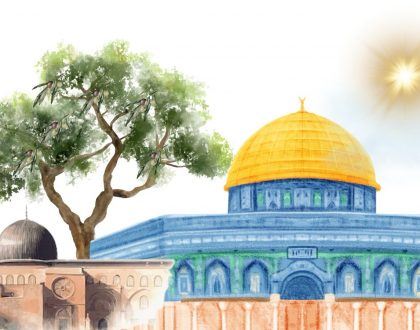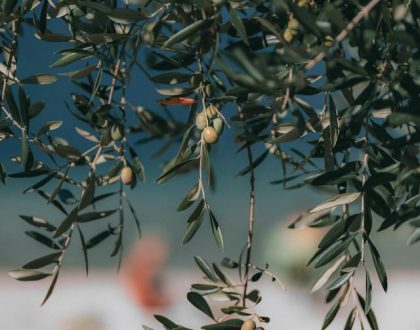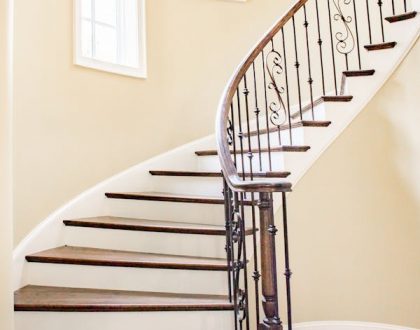Loving your Parents

by Ayesha Khan
Recently I have had friends who have lost their parents – some of their parents were quite old and quite sick, but it didn’t make it any less sad for them. Even if you live to ninety-nine, and your mum is still alive, she is still your mum and the pain of her loss is acute.
There is something very special in the bond that God created between parents and children.
‘We created you out of dust, then out of a sperm, then We fashioned you into something which clings into a chewed lump of flesh, partly formed and partly unformed.’ [22:5]
This verse from the Quran details the stages of embryonic development, and Muslims love to quote it because it was described 1400 years ago, long before we had the scientific technology to chart foetal development. The word that particularly interests me in verse is ‘cling’.
Some years ago, there a scientific study which showed that even after a baby has been born, it leaves traces of itself inside the mother. During the pregnancy, cells from the foetus cross the placenta and enter the mother’s body, where they can become part of her tissues.
So it is literally true that a child is part of their mother for life.
That bond between a mother and her child is utterly unique – it’s not just you who carry the genes of your parents, but your mother has a very deep connection with you for the rest of her life.
Biology doesn’t explain it all. When you have a heart transplant, you don’t fall in love with your donor. In addition to this biology, God has given mothers a maternal instinct. This instinct which drives a mother to wake up when she hears her baby crying in the middle of the night, even when she is exhausted. The instinct to keep pestering you to make sure you have eaten. To rush to you if you are in danger. And to sacrifice whatever she has for your needs.
A mother’s home is where you are welcome anytime day or night, and a mother’s heart is where you always have a home.
This instinct is not present in all animals. Certain creatures contain this to a greater level than others.
My top 5 mums are:
5. Cheetahs: Female cheetahs usually have four to six cubs to care for, but they aren’t born with survival instincts. It’s up to Mum to teach them how to hunt prey and avoid other predators, and this training can take nearly two years to sink in. Once the cubs learn to fend for themselves, Mum moves on to start a new family, while her offspring left behind form a sibling group. The boys stay together and the girls go off alone.
4. Orangutans: An orangutan mother never puts her babies down, generally nursing offspring until they reach the age or 6 or 7 — that’s the longest dependence of any animal on Earth.
3. Penguins: Each female produces a single egg. She transfers the egg to her mate, then leaves to spend winter in the open ocean to find food.
During Antarctica’s winter – a frigid night four months long – male Emperor Penguins huddle by the hundreds in the snow. The male penguins guard the eggs and keep them warm. Each male penguin puts his egg on his feet. He covers it with a fold of skin. In this way, he keeps it warm at about 38 degrees Celsius while the outside temperatures can drop well below -35 degrees C.
For 65 days, each bird incubates an egg, huddled in large colonies with only feathers, fat, and each other to stay warm. The eggs may begin to hatch in July, but the male penguins’ winter vigil won’t end until around August when the sun peeks over the horizon.
By the time the female returns, sleek and full of food, the male may have lost 45% of his body weight. Ravenously hungry, he leaves to feed at sea. The offspring grow rapidly in summer when food at sea is plentiful. By winter, the chicks are on their own. Male penguins are probably the most devoted fathers in the animal world.
2. Octopuses: When it comes to having babies, the female octopus doesn’t mess around — she lays over 50,000 eggs. It takes around 40 days for the eggs to develop before hatching, and the mother stays close to them the entire time, protecting them from predators while gently blowing currents of water over them to provide oxygen. But playing bodyguard to the eggs also prohibits her from hunting for herself, so she watches them until the last egg hatches, and, unnourished herself, she then dies.
1. The MUM
The prize goes to human mothers. If you think about human parents as a comparison, they are there for their child for life. Most children become independent at some point, but in cases where a child is disabled, a mother will continue to look after that child as long as she lives. It is not in our nature to abandon our young, even after they are full grown and independent. In fact, they go on to support their grandchildren as well.
And if you think about, there is almost no other creature that you would sacrifice your time, money, sleep, health for, unless you really, really loved them and cared about them. It is because God put this love inside parents that they can’t help but love their babies.
The source of unending love
For Muslims, God is the source of all love and He loves us beyond our capacity to imagine. It is no coincidence that the word for a mother’s womb is ‘rahm’ which related to the word rahma which means love and care and concern. In Arabic, the words God uses to describe Himself the most frequently in the Quran is Ar-Rahman and Ar-Rahim which mean the MOST loving and caring of all.
And we know that God loves us more than our mothers.
Ultimately, unlike any other relationship that you have, your parents wish the best for you. There is no one else who is rooting for you in that selfless way. Siblings may feel jealous of each other, but parents want the world for you.
Not just now, but for your future and for Muslims particularly for your afterlife. They want you to succeed, and they want you to be good human beings and they love you unconditionally.
I know my parents will drop anything they have to come and help me when I am stuck. I know my father worked very hard, and that my mother could have had her own career but chose to stay home and look after us.
You can do things that disappoint them, but even then, no matter how bad you might be, they are always still there for you.
We all know that there is nice food to eat at home, our clothes get magically washed and reappear in our cupboards, but behind the scenes a parent is always thinking about what more they can do to make sure that their children have everything they need – whether it is their football boots, or extra tuition, or playdates, they make you the priority in their lives. One of the biggest problems facing children who have no one to care for them is that they miss out on the love and support that parents give you, that you don’t even notice much of the time.
The Prophet Muhammad as a father
The Prophet Muhammad* was the best father. At a time when men were chauvinists and daughters were not valued, he would stand every time his daughter came into the room, out of respect for her. As parents we can learn a lot from him. And of course he and the Quran always championed the cause of orphans.
The Prophet* loved children, and always encouraged parents to show affection to their children. He would lift them up on his shoulders, give them presents, play with them. He taught us that a child should be free to play until the age of 7; that children needed to be treated with respect and kindness. If a child cried in the mosque he would speed up the prayer. His own grandsons would climb onto his shoulders while he prayed.
The Grumpy Teen
There is an attitude that is promoted by the media of the grumpy teenager shouting at their parents. There is an automatic acceptance of bad behaviour, because of teenage brains being re-wired that make it impossible for them to be civil. The idea that their parents are out of touch with their generation and a nuisance, restricting them from enjoying themselves.
Islam’s view of parents is different. We have to be respectful at all times and to all people. But especially to our parents.
In the Quran, it says: ‘And your Lord has decreed that you worship none but Him. And that you be dutiful to your parents. If one of them or both of them attain old age in your life, say not to them a word of disrespect, nor shout at them but address them in terms of honour. And lower unto them the wing of submission and humility through mercy, and say “My Lord! Bestow on them Your Mercy as they did bring me up when I was young.”’ [17:23-24]
Respecting and honouring parents
As the Quran was revealed over 23 years, and rules came down a bit at a time, this command came before any of the five pillars. So after the basic premise of Islam, worshipping One God, came the second most important ruling:
‘And be dutiful to your parents.’
The status of parents is second only to God, and we are told to treat them with excellence and give them more than what is expected.
God says do not to even say ‘uff’ to them.
Uff is an expression of irritation, for example tutting, or rolling our eyes at them. So there is no room here to answer back or be rude.
When our parents make us feel frustrated we should lower our wings of mercy and compassion towards them, just as they did when we were small. The sleepless nights they had when looking after us as babies.
The Prophet* reminded us that the mother and father are the largest door to Jannah. They are the easiest way to enter Jannah through helping them.
We pray for our parents and we pray that our parents are pleased with us.
We are asked to look after our parents if they reach old age. And told that God has created us in a cycle. We are born weak, grow to be strong and then reach old age, where we become weak again. So, if our parents reach this state, then it is a blessing for us, to be able to look after them in this child like state.
We don’t know how long we have with our parents so treasure the time you have with them. They cannot be perfect, because humans are not perfect but they try their best.
In Islam is it is mothers’ day every day!
Six Islamic ways to respect your parents:
Obey them
They want the best for you. Obey them kindly.
You can show your mum and dad you love them by doing as they say and what is expected of you. By obeying them, you are obeying God and this pleases him. When they ask you do something doing it cheerfully without moaning would earn you extra brownie points.
Talk
Talk to your parents about your feelings – your worries, fears and excitement. Do not stonewall them because parents offer words of wisdom. Just because they are not the same age as us does not mean they can’t understand you.
Tell the truth – build trust with them
In Islam lying is hated. By telling the truth you build trust between you and your parents.
Be cheerful
The Prophet* was full of happiness and smiles.
Watch any family TV show and there’s bound to be a moody teenager. Sad, I know. There’s no reason we can’t change this stereotype and be happy. Laugh with your parents (their jokes are funny… sometimes).
Thank them
Remember who your parents are – father and mother – and give them respect for all they’ve done for you and for their role in your life. This may seem silly, but you can show your parents love by simply thanking them for being your mum and dad. They are not just everyone else, they are different. They are your parents!
Tell them you love them
It is comforting and loving to your parents to hear that you love them. Shout it out loud, text it, mime it. However you choose to do it, make sure they know you love them!
*peace be upon him
Delivered by A. Khan to Haberdasher’s Askes’ School for Girls in 2018
Recommended Posts

Masjid al Aqsa – why it has a very special place in our hearts
November 29, 2023

Palestine: The Holy Land
November 23, 2023






